Abstract
Mucinous carcinomas are defined on the basis of the amount of the mucus component in the tumour mass. Apart from this quantitative criterion, a number of clinicopathological parameters (such as localisation, prevalence in different countries and age groups, association with HNPCC and inflammatory processes) and genetic alterations (e.g. frequency of mutation in Ki-ras and p53 genes, level of MUC2 expression) differentiate these tumours from the non-mucinous ones. Since a different set of genetic lesions implies different inducing agents, these observations suggest that there may be a 'mucinous pathway of carcinogenesis'. Further identification of genetic changes characteristic of the mucinous phenotype will help to understand the aetiology of these tumours and possibly establish markers for detection of the high-risk group.
Full text
PDF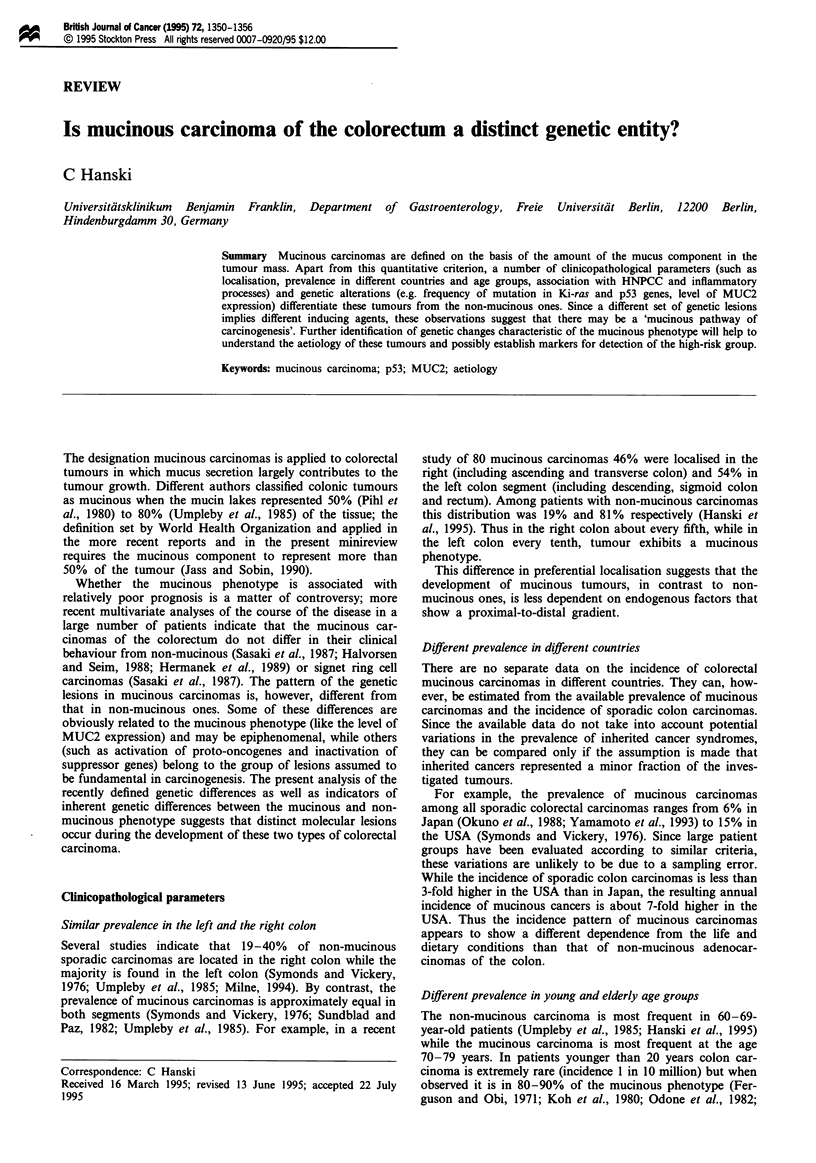
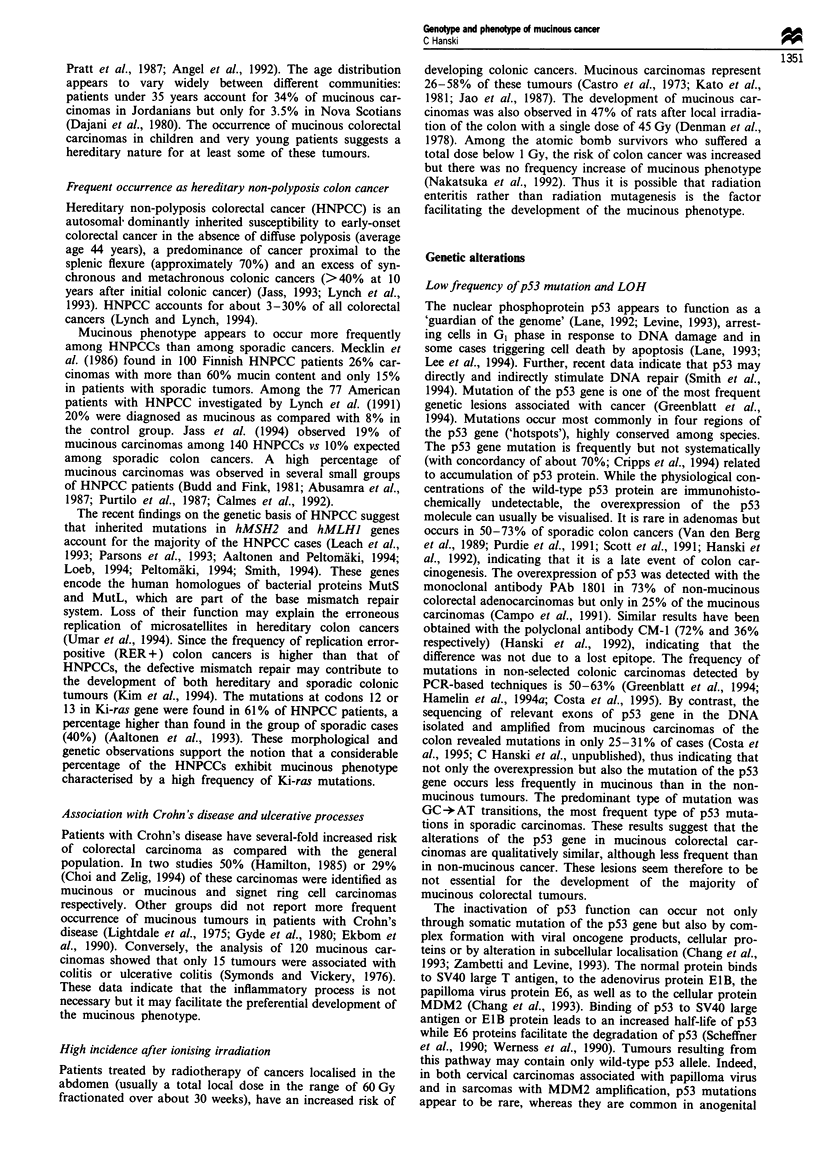
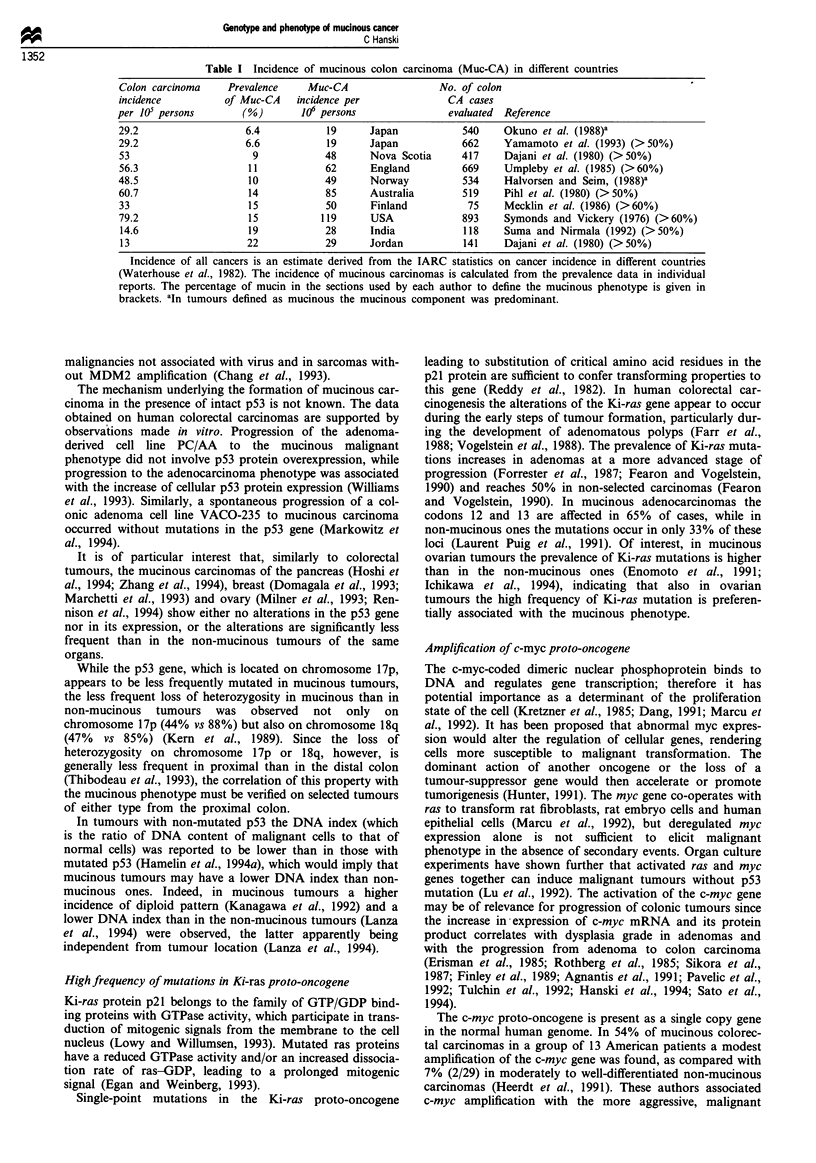
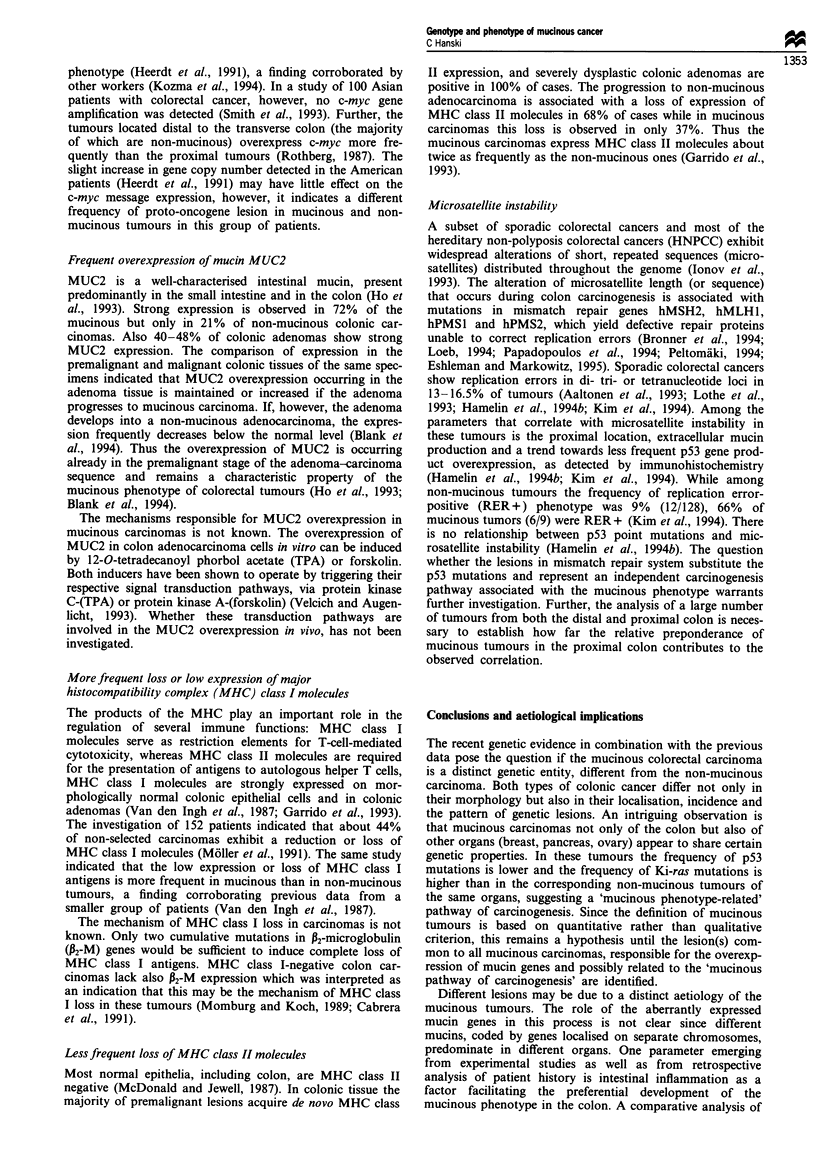
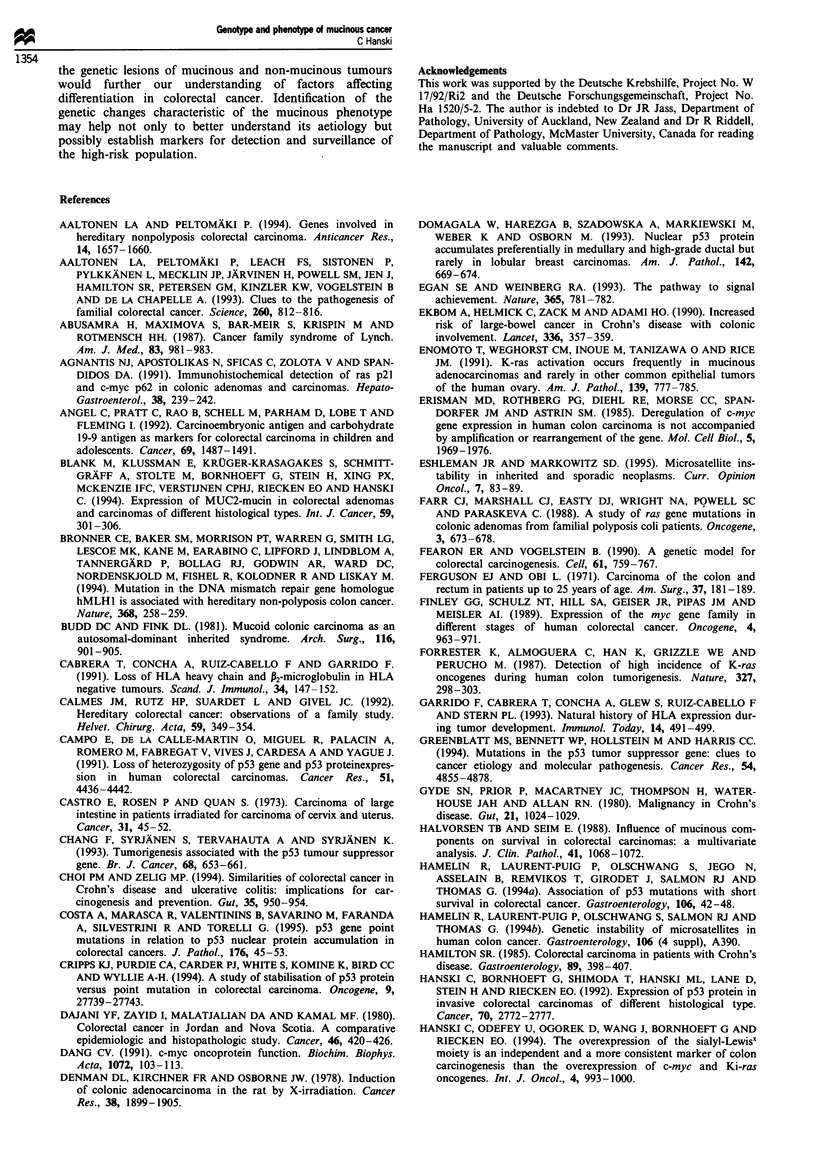
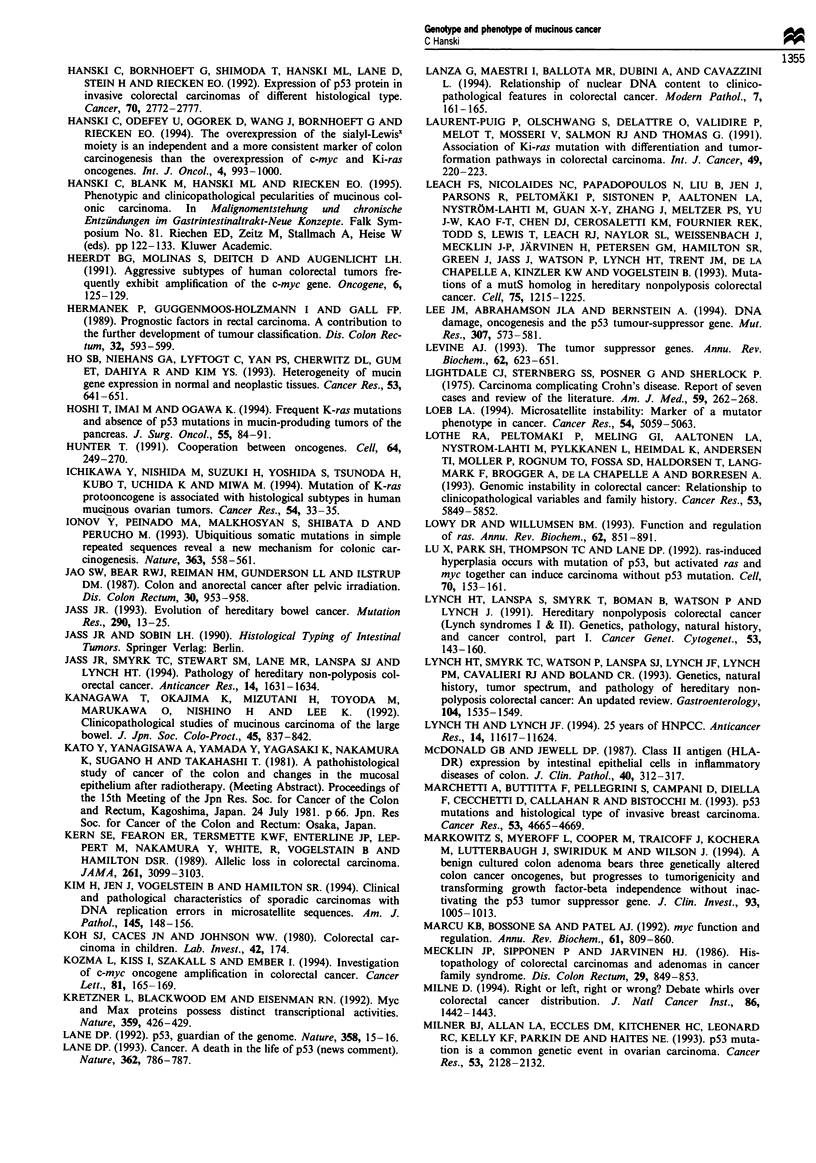
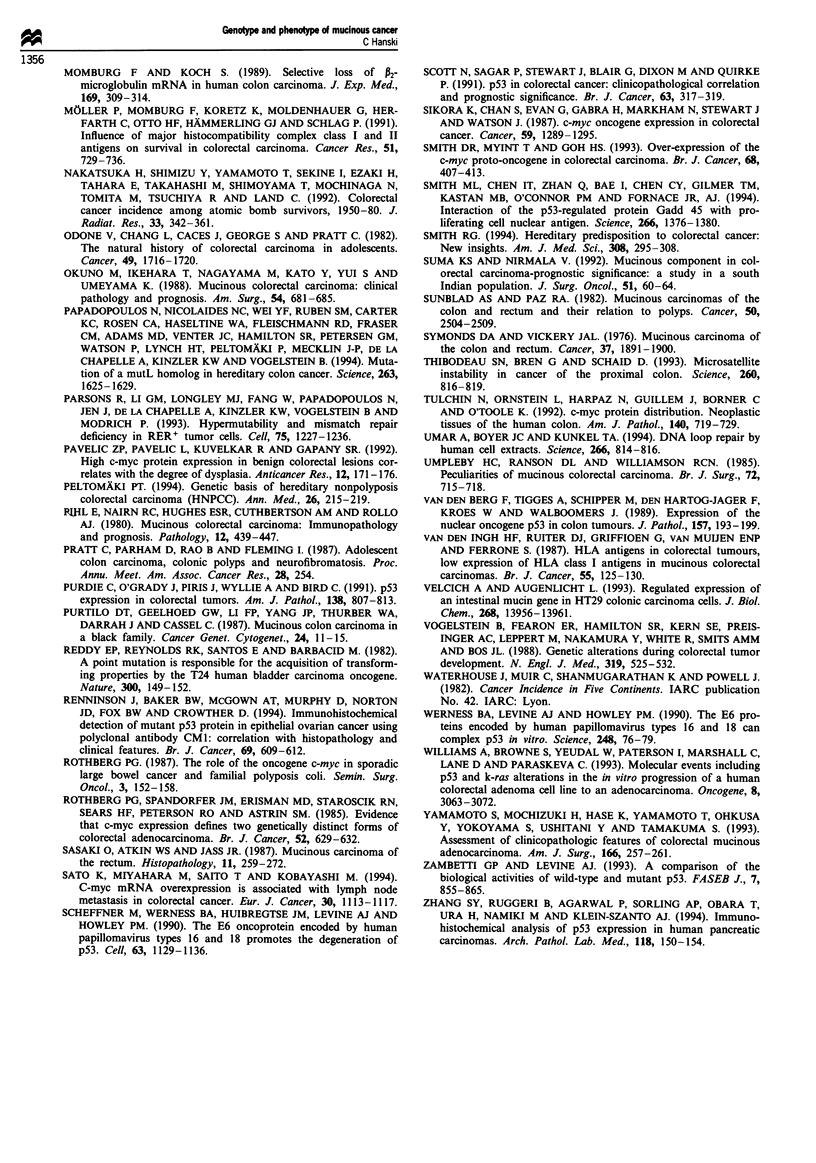
Selected References
These references are in PubMed. This may not be the complete list of references from this article.
- Aaltonen L. A., Peltomäki P. Genes involved in hereditary nonpolyposis colorectal carcinoma. Anticancer Res. 1994 Jul-Aug;14(4B):1657–1660. [PubMed] [Google Scholar]
- Aaltonen L. A., Peltomäki P., Leach F. S., Sistonen P., Pylkkänen L., Mecklin J. P., Järvinen H., Powell S. M., Jen J., Hamilton S. R. Clues to the pathogenesis of familial colorectal cancer. Science. 1993 May 7;260(5109):812–816. doi: 10.1126/science.8484121. [DOI] [PubMed] [Google Scholar]
- Abusamra H., Maximova S., Bar-Meir S., Krispin M., Rotmensch H. H. Cancer family syndrome of Lynch. Am J Med. 1987 Nov;83(5):981–983. doi: 10.1016/0002-9343(87)90665-6. [DOI] [PubMed] [Google Scholar]
- Agnantis N. J., Apostolikas N., Sficas C., Zolota V., Spandidos D. A. Immunohistochemical detection of ras p21 and c-myc p62 in colonic adenomas and carcinomas. Hepatogastroenterology. 1991 Jun;38(3):239–242. [PubMed] [Google Scholar]
- Angel C. A., Pratt C. B., Rao B. N., Schell M. J., Parham D. M., Lobe T. E., Fleming I. D. Carcinoembryonic antigen and carbohydrate 19-9 antigen as markers for colorectal carcinoma in children and adolescents. Cancer. 1992 Mar 15;69(6):1487–1491. doi: 10.1002/1097-0142(19920315)69:6<1487::aid-cncr2820690629>3.0.co;2-0. [DOI] [PubMed] [Google Scholar]
- Blank M., Klussmann E., Krüger-Krasagakes S., Schmitt-Gräff A., Stolte M., Bornhoeft G., Stein H., Xing P. X., McKenzie I. F., Verstijnen C. P. Expression of MUC2-mucin in colorectal adenomas and carcinomas of different histological types. Int J Cancer. 1994 Nov 1;59(3):301–306. doi: 10.1002/ijc.2910590302. [DOI] [PubMed] [Google Scholar]
- Bronner C. E., Baker S. M., Morrison P. T., Warren G., Smith L. G., Lescoe M. K., Kane M., Earabino C., Lipford J., Lindblom A. Mutation in the DNA mismatch repair gene homologue hMLH1 is associated with hereditary non-polyposis colon cancer. Nature. 1994 Mar 17;368(6468):258–261. doi: 10.1038/368258a0. [DOI] [PubMed] [Google Scholar]
- Budd D. C., Fink D. L. Mucoid colonic carcinoma as an autosomal-dominant inherited syndrome. Arch Surg. 1981 Jul;116(7):901–905. doi: 10.1001/archsurg.1981.01380190035008. [DOI] [PubMed] [Google Scholar]
- Cabrera T., Concha A., Ruiz-Cabello F., Garrido F. Loss of HLA heavy chain and beta 2-microglobulin in HLA negative tumours. Scand J Immunol. 1991 Aug;34(2):147–152. doi: 10.1111/j.1365-3083.1991.tb01531.x. [DOI] [PubMed] [Google Scholar]
- Campo E., de la Calle-Martin O., Miquel R., Palacin A., Romero M., Fabregat V., Vives J., Cardesa A., Yague J. Loss of heterozygosity of p53 gene and p53 protein expression in human colorectal carcinomas. Cancer Res. 1991 Aug 15;51(16):4436–4442. [PubMed] [Google Scholar]
- Castro E. B., Rosen P. P., Quan S. H. Carcinoma of large intestine in patients irradiated for carcinoma of cervix and uterus. Cancer. 1973 Jan;31(1):45–52. doi: 10.1002/1097-0142(197301)31:1<45::aid-cncr2820310107>3.0.co;2-5. [DOI] [PubMed] [Google Scholar]
- Chang F., Syrjänen S., Tervahauta A., Syrjänen K. Tumourigenesis associated with the p53 tumour suppressor gene. Br J Cancer. 1993 Oct;68(4):653–661. doi: 10.1038/bjc.1993.404. [DOI] [PMC free article] [PubMed] [Google Scholar]
- Choi P. M., Zelig M. P. Similarity of colorectal cancer in Crohn's disease and ulcerative colitis: implications for carcinogenesis and prevention. Gut. 1994 Jul;35(7):950–954. doi: 10.1136/gut.35.7.950. [DOI] [PMC free article] [PubMed] [Google Scholar]
- Costa A., Marasca R., Valentinis B., Savarino M., Faranda A., Silvestrini R., Torelli G. p53 gene point mutations in relation to p53 nuclear protein accumulation in colorectal cancers. J Pathol. 1995 May;176(1):45–53. doi: 10.1002/path.1711760108. [DOI] [PubMed] [Google Scholar]
- Dajani Y. F., Zayid I., Malatjalian D. A., Kamal M. F. Colorectal cancer in Jordan and Nova Scotia: a comparative epidemiologic and histopathologic study. Cancer. 1980 Jul 15;46(2):420–428. doi: 10.1002/1097-0142(19800715)46:2<420::aid-cncr2820460236>3.0.co;2-1. [DOI] [PubMed] [Google Scholar]
- Dang C. V. c-myc oncoprotein function. Biochim Biophys Acta. 1991 Dec 10;1072(2-3):103–113. doi: 10.1016/0304-419x(91)90009-a. [DOI] [PubMed] [Google Scholar]
- Denman D. L., Kirchner F. R., Osborne J. W. Induction of colonic adenocarcinoma in the rat by X-irradiation. Cancer Res. 1978 Jul;38(7):1899–1905. [PubMed] [Google Scholar]
- Domagala W., Harezga B., Szadowska A., Markiewski M., Weber K., Osborn M. Nuclear p53 protein accumulates preferentially in medullary and high-grade ductal but rarely in lobular breast carcinomas. Am J Pathol. 1993 Mar;142(3):669–674. [PMC free article] [PubMed] [Google Scholar]
- Egan S. E., Weinberg R. A. The pathway to signal achievement. Nature. 1993 Oct 28;365(6449):781–783. doi: 10.1038/365781a0. [DOI] [PubMed] [Google Scholar]
- Ekbom A., Helmick C., Zack M., Adami H. O. Increased risk of large-bowel cancer in Crohn's disease with colonic involvement. Lancet. 1990 Aug 11;336(8711):357–359. doi: 10.1016/0140-6736(90)91889-i. [DOI] [PubMed] [Google Scholar]
- Enomoto T., Weghorst C. M., Inoue M., Tanizawa O., Rice J. M. K-ras activation occurs frequently in mucinous adenocarcinomas and rarely in other common epithelial tumors of the human ovary. Am J Pathol. 1991 Oct;139(4):777–785. [PMC free article] [PubMed] [Google Scholar]
- Erisman M. D., Rothberg P. G., Diehl R. E., Morse C. C., Spandorfer J. M., Astrin S. M. Deregulation of c-myc gene expression in human colon carcinoma is not accompanied by amplification or rearrangement of the gene. Mol Cell Biol. 1985 Aug;5(8):1969–1976. doi: 10.1128/mcb.5.8.1969. [DOI] [PMC free article] [PubMed] [Google Scholar]
- Eshleman J. R., Markowitz S. D. Microsatellite instability in inherited and sporadic neoplasms. Curr Opin Oncol. 1995 Jan;7(1):83–89. [PubMed] [Google Scholar]
- Farr C. J., Marshall C. J., Easty D. J., Wright N. A., Powell S. C., Paraskeva C. A study of ras gene mutations in colonic adenomas from familial polyposis coli patients. Oncogene. 1988 Dec;3(6):673–678. [PubMed] [Google Scholar]
- Fearon E. R., Vogelstein B. A genetic model for colorectal tumorigenesis. Cell. 1990 Jun 1;61(5):759–767. doi: 10.1016/0092-8674(90)90186-i. [DOI] [PubMed] [Google Scholar]
- Ferguson E., Jr, Obi L. J. Carcinoma of the colon and rectum in patients up to 25 years of age. Am Surg. 1971 Apr;37(4):181–189. [PubMed] [Google Scholar]
- Finley G. G., Schulz N. T., Hill S. A., Geiser J. R., Pipas J. M., Meisler A. I. Expression of the myc gene family in different stages of human colorectal cancer. Oncogene. 1989 Aug;4(8):963–971. [PubMed] [Google Scholar]
- Forrester K., Almoguera C., Han K., Grizzle W. E., Perucho M. Detection of high incidence of K-ras oncogenes during human colon tumorigenesis. 1987 May 28-Jun 3Nature. 327(6120):298–303. doi: 10.1038/327298a0. [DOI] [PubMed] [Google Scholar]
- Garrido F., Cabrera T., Concha A., Glew S., Ruiz-Cabello F., Stern P. L. Natural history of HLA expression during tumour development. Immunol Today. 1993 Oct;14(10):491–499. doi: 10.1016/0167-5699(93)90264-L. [DOI] [PubMed] [Google Scholar]
- Greenblatt M. S., Bennett W. P., Hollstein M., Harris C. C. Mutations in the p53 tumor suppressor gene: clues to cancer etiology and molecular pathogenesis. Cancer Res. 1994 Sep 15;54(18):4855–4878. [PubMed] [Google Scholar]
- Gyde S. N., Prior P., Macartney J. C., Thompson H., Waterhouse J. A., Allan R. N. Malignancy in Crohn's disease. Gut. 1980 Dec;21(12):1024–1029. doi: 10.1136/gut.21.12.1024. [DOI] [PMC free article] [PubMed] [Google Scholar]
- Halvorsen T. B., Seim E. Influence of mucinous components on survival in colorectal adenocarcinomas: a multivariate analysis. J Clin Pathol. 1988 Oct;41(10):1068–1072. doi: 10.1136/jcp.41.10.1068. [DOI] [PMC free article] [PubMed] [Google Scholar]
- Hamelin R., Laurent-Puig P., Olschwang S., Jego N., Asselain B., Remvikos Y., Girodet J., Salmon R. J., Thomas G. Association of p53 mutations with short survival in colorectal cancer. Gastroenterology. 1994 Jan;106(1):42–48. doi: 10.1016/s0016-5085(94)94217-x. [DOI] [PubMed] [Google Scholar]
- Hamilton S. R. Colorectal carcinoma in patients with Crohn's disease. Gastroenterology. 1985 Aug;89(2):398–407. doi: 10.1016/0016-5085(85)90343-9. [DOI] [PubMed] [Google Scholar]
- Hanski C., Bornhoeft G., Shimoda T., Hanski M. L., Lane D. P., Stein H., Riecken E. O. Expression of p53 protein in invasive colorectal carcinomas of different histologic types. Cancer. 1992 Dec 15;70(12):2772–2777. doi: 10.1002/1097-0142(19921215)70:12<2772::aid-cncr2820701208>3.0.co;2-5. [DOI] [PubMed] [Google Scholar]
- Heerdt B. G., Molinas S., Deitch D., Augenlicht L. H. Aggressive subtypes of human colorectal tumors frequently exhibit amplification of the c-myc gene. Oncogene. 1991 Jan;6(1):125–129. [PubMed] [Google Scholar]
- Hermanek P., Guggenmoos-Holzmann I., Gall F. P. Prognostic factors in rectal carcinoma. A contribution to the further development of tumor classification. Dis Colon Rectum. 1989 Jul;32(7):593–599. doi: 10.1007/BF02554180. [DOI] [PubMed] [Google Scholar]
- Ho S. B., Niehans G. A., Lyftogt C., Yan P. S., Cherwitz D. L., Gum E. T., Dahiya R., Kim Y. S. Heterogeneity of mucin gene expression in normal and neoplastic tissues. Cancer Res. 1993 Feb 1;53(3):641–651. [PubMed] [Google Scholar]
- Hoshi T., Imai M., Ogawa K. Frequent K-ras mutations and absence of p53 mutations in mucin-producing tumors of the pancreas. J Surg Oncol. 1994 Feb;55(2):84–91. doi: 10.1002/jso.2930550205. [DOI] [PubMed] [Google Scholar]
- Hunter T. Cooperation between oncogenes. Cell. 1991 Jan 25;64(2):249–270. doi: 10.1016/0092-8674(91)90637-e. [DOI] [PubMed] [Google Scholar]
- Ichikawa Y., Nishida M., Suzuki H., Yoshida S., Tsunoda H., Kubo T., Uchida K., Miwa M. Mutation of K-ras protooncogene is associated with histological subtypes in human mucinous ovarian tumors. Cancer Res. 1994 Jan 1;54(1):33–35. [PubMed] [Google Scholar]
- Ionov Y., Peinado M. A., Malkhosyan S., Shibata D., Perucho M. Ubiquitous somatic mutations in simple repeated sequences reveal a new mechanism for colonic carcinogenesis. Nature. 1993 Jun 10;363(6429):558–561. doi: 10.1038/363558a0. [DOI] [PubMed] [Google Scholar]
- Jao S. W., Beart R. W., Jr, Reiman H. M., Gunderson L. L., Ilstrup D. M. Colon and anorectal cancer after pelvic irradiation. Dis Colon Rectum. 1987 Dec;30(12):953–958. doi: 10.1007/BF02554284. [DOI] [PubMed] [Google Scholar]
- Jass J. R. Evolution of hereditary bowel cancer. Mutat Res. 1993 Nov;290(1):13–25. doi: 10.1016/0027-5107(93)90028-e. [DOI] [PubMed] [Google Scholar]
- Jass J. R., Smyrk T. C., Stewart S. M., Lane M. R., Lanspa S. J., Lynch H. T. Pathology of hereditary non-polyposis colorectal cancer. Anticancer Res. 1994 Jul-Aug;14(4B):1631–1634. [PubMed] [Google Scholar]
- Kern S. E., Fearon E. R., Tersmette K. W., Enterline J. P., Leppert M., Nakamura Y., White R., Vogelstein B., Hamilton S. R. Clinical and pathological associations with allelic loss in colorectal carcinoma [corrected]. JAMA. 1989 Jun 2;261(21):3099–3103. doi: 10.1001/jama.261.21.3099. [DOI] [PubMed] [Google Scholar]
- Kim H., Jen J., Vogelstein B., Hamilton S. R. Clinical and pathological characteristics of sporadic colorectal carcinomas with DNA replication errors in microsatellite sequences. Am J Pathol. 1994 Jul;145(1):148–156. [PMC free article] [PubMed] [Google Scholar]
- Kozma L., Kiss I., Szakáll S., Ember I. Investigation of c-myc oncogene amplification in colorectal cancer. Cancer Lett. 1994 Jun 30;81(2):165–169. doi: 10.1016/0304-3835(94)90198-8. [DOI] [PubMed] [Google Scholar]
- Kretzner L., Blackwood E. M., Eisenman R. N. Myc and Max proteins possess distinct transcriptional activities. Nature. 1992 Oct 1;359(6394):426–429. doi: 10.1038/359426a0. [DOI] [PubMed] [Google Scholar]
- Lane D. P. Cancer. A death in the life of p53. Nature. 1993 Apr 29;362(6423):786–787. doi: 10.1038/362786a0. [DOI] [PubMed] [Google Scholar]
- Lanza G., Jr, Maestri I., Ballotta M. R., Dubini A., Cavazzini L. Relationship of nuclear DNA content to clinicopathologic features in colorectal cancer. Mod Pathol. 1994 Feb;7(2):161–165. [PubMed] [Google Scholar]
- Laurent-Puig P., Olschwang S., Delattre O., Validire P., Melot T., Mosseri V., Salmon R. J., Thomas G. Association of Ki-ras mutation with differentiation and tumor-formation pathways in colorectal carcinoma. Int J Cancer. 1991 Sep 9;49(2):220–223. doi: 10.1002/ijc.2910490213. [DOI] [PubMed] [Google Scholar]
- Lee J. M., Abrahamson J. L., Bernstein A. DNA damage, oncogenesis and the p53 tumour-suppressor gene. Mutat Res. 1994 Jun 1;307(2):573–581. doi: 10.1016/0027-5107(94)90267-4. [DOI] [PubMed] [Google Scholar]
- Levine A. J. The tumor suppressor genes. Annu Rev Biochem. 1993;62:623–651. doi: 10.1146/annurev.bi.62.070193.003203. [DOI] [PubMed] [Google Scholar]
- Lightdale C. J., Sternberg S. S., Posner G., Sherlock P. Carcinoma complicating Crohn's disease. Report of seven cases and review of the literature. Am J Med. 1975 Aug;59(2):262–268. doi: 10.1016/0002-9343(75)90361-7. [DOI] [PubMed] [Google Scholar]
- Loeb L. A. Microsatellite instability: marker of a mutator phenotype in cancer. Cancer Res. 1994 Oct 1;54(19):5059–5063. [PubMed] [Google Scholar]
- Lothe R. A., Peltomäki P., Meling G. I., Aaltonen L. A., Nyström-Lahti M., Pylkkänen L., Heimdal K., Andersen T. I., Møller P., Rognum T. O. Genomic instability in colorectal cancer: relationship to clinicopathological variables and family history. Cancer Res. 1993 Dec 15;53(24):5849–5852. [PubMed] [Google Scholar]
- Lowy D. R., Willumsen B. M. Function and regulation of ras. Annu Rev Biochem. 1993;62:851–891. doi: 10.1146/annurev.bi.62.070193.004223. [DOI] [PubMed] [Google Scholar]
- Lu X., Park S. H., Thompson T. C., Lane D. P. Ras-induced hyperplasia occurs with mutation of p53, but activated ras and myc together can induce carcinoma without p53 mutation. Cell. 1992 Jul 10;70(1):153–161. doi: 10.1016/0092-8674(92)90541-j. [DOI] [PubMed] [Google Scholar]
- Lynch H. T., Lanspa S., Smyrk T., Boman B., Watson P., Lynch J. Hereditary nonpolyposis colorectal cancer (Lynch syndromes I & II). Genetics, pathology, natural history, and cancer control, Part I. Cancer Genet Cytogenet. 1991 Jun;53(2):143–160. doi: 10.1016/0165-4608(91)90093-a. [DOI] [PubMed] [Google Scholar]
- Lynch H. T., Smyrk T. C., Watson P., Lanspa S. J., Lynch J. F., Lynch P. M., Cavalieri R. J., Boland C. R. Genetics, natural history, tumor spectrum, and pathology of hereditary nonpolyposis colorectal cancer: an updated review. Gastroenterology. 1993 May;104(5):1535–1549. doi: 10.1016/0016-5085(93)90368-m. [DOI] [PubMed] [Google Scholar]
- Marchetti A., Buttitta F., Pellegrini S., Campani D., Diella F., Cecchetti D., Callahan R., Bistocchi M. p53 mutations and histological type of invasive breast carcinoma. Cancer Res. 1993 Oct 1;53(19):4665–4669. [PubMed] [Google Scholar]
- Marcu K. B., Bossone S. A., Patel A. J. myc function and regulation. Annu Rev Biochem. 1992;61:809–860. doi: 10.1146/annurev.bi.61.070192.004113. [DOI] [PubMed] [Google Scholar]
- Markowitz S. D., Myeroff L., Cooper M. J., Traicoff J., Kochera M., Lutterbaugh J., Swiriduk M., Willson J. K. A benign cultured colon adenoma bears three genetically altered colon cancer oncogenes, but progresses to tumorigenicity and transforming growth factor-beta independence without inactivating the p53 tumor suppressor gene. J Clin Invest. 1994 Mar;93(3):1005–1013. doi: 10.1172/JCI117048. [DOI] [PMC free article] [PubMed] [Google Scholar]
- McDonald G. B., Jewell D. P. Class II antigen (HLA-DR) expression by intestinal epithelial cells in inflammatory diseases of colon. J Clin Pathol. 1987 Mar;40(3):312–317. doi: 10.1136/jcp.40.3.312. [DOI] [PMC free article] [PubMed] [Google Scholar]
- Mecklin J. P., Sipponen P., Järvinen H. J. Histopathology of colorectal carcinomas and adenomas in cancer family syndrome. Dis Colon Rectum. 1986 Dec;29(12):849–853. doi: 10.1007/BF02555362. [DOI] [PubMed] [Google Scholar]
- Milne D. Right or left, right or wrong? Debate whirls over colorectal cancer distribution. J Natl Cancer Inst. 1994 Oct 5;86(19):1442–1443. doi: 10.1093/jnci/86.19.1442. [DOI] [PubMed] [Google Scholar]
- Milner B. J., Allan L. A., Eccles D. M., Kitchener H. C., Leonard R. C., Kelly K. F., Parkin D. E., Haites N. E. p53 mutation is a common genetic event in ovarian carcinoma. Cancer Res. 1993 May 1;53(9):2128–2132. [PubMed] [Google Scholar]
- Momburg F., Koch S. Selective loss of beta 2-microglobulin mRNA in human colon carcinoma. J Exp Med. 1989 Jan 1;169(1):309–314. doi: 10.1084/jem.169.1.309. [DOI] [PMC free article] [PubMed] [Google Scholar]
- Möller P., Momburg F., Koretz K., Moldenhauer G., Herfarth C., Otto H. F., Hämmerling G. J., Schlag P. Influence of major histocompatibility complex class I and II antigens on survival in colorectal carcinoma. Cancer Res. 1991 Jan 15;51(2):729–736. [PubMed] [Google Scholar]
- Nakatsuka H., Shimizu Y., Yamamoto T., Sekine I., Ezaki H., Tahara E., Takahashi M., Shimoyama T., Mochinaga N., Tomita M. Colorectal cancer incidence among atomic bomb survivors, 1950-80. J Radiat Res. 1992 Dec;33(4):342–361. doi: 10.1269/jrr.33.342. [DOI] [PubMed] [Google Scholar]
- Odone V., Chang L., Caces J., George S. L., Pratt C. B. The natural history of colorectal carcinoma in adolescents. Cancer. 1982 Apr 15;49(8):1716–1720. doi: 10.1002/1097-0142(19820415)49:8<1716::aid-cncr2820490831>3.0.co;2-m. [DOI] [PubMed] [Google Scholar]
- Okuno M., Ikehara T., Nagayama M., Kato Y., Yui S., Umeyama K. Mucinous colorectal carcinoma: clinical pathology and prognosis. Am Surg. 1988 Nov;54(11):681–685. [PubMed] [Google Scholar]
- Papadopoulos N., Nicolaides N. C., Wei Y. F., Ruben S. M., Carter K. C., Rosen C. A., Haseltine W. A., Fleischmann R. D., Fraser C. M., Adams M. D. Mutation of a mutL homolog in hereditary colon cancer. Science. 1994 Mar 18;263(5153):1625–1629. doi: 10.1126/science.8128251. [DOI] [PubMed] [Google Scholar]
- Parsons R., Li G. M., Longley M. J., Fang W. H., Papadopoulos N., Jen J., de la Chapelle A., Kinzler K. W., Vogelstein B., Modrich P. Hypermutability and mismatch repair deficiency in RER+ tumor cells. Cell. 1993 Dec 17;75(6):1227–1236. doi: 10.1016/0092-8674(93)90331-j. [DOI] [PubMed] [Google Scholar]
- Pavelic Z. P., Pavelic L., Kuvelkar R., Gapany S. R. High c-myc protein expression in benign colorectal lesions correlates with the degree of dysplasia. Anticancer Res. 1992 Jan-Feb;12(1):171–175. [PubMed] [Google Scholar]
- Peltomäki P. T. Genetic basis of hereditary nonpolyposis colorectal carcinoma (HNPCC). Ann Med. 1994 Jun;26(3):215–219. doi: 10.3109/07853899409147893. [DOI] [PubMed] [Google Scholar]
- Pihl E., Nairn R. C., Hughes E. S., Cuthbertson A. M., Rollo A. J. Mucinous colorectal carcinoma: immunopathology and prognosis. Pathology. 1980 Jul;12(3):439–447. doi: 10.3109/00313028009077107. [DOI] [PubMed] [Google Scholar]
- Purdie C. A., O'Grady J., Piris J., Wyllie A. H., Bird C. C. p53 expression in colorectal tumors. Am J Pathol. 1991 Apr;138(4):807–813. [PMC free article] [PubMed] [Google Scholar]
- Purtilo D. T., Geelhoed G. W., Li F. P., Yang J. P., Thurber W. A., Darrah J., Cassel C. Mucinous colon carcinoma in a black family. Cancer Genet Cytogenet. 1987 Jan;24(1):11–15. doi: 10.1016/0165-4608(87)90079-3. [DOI] [PubMed] [Google Scholar]
- Reddy E. P., Reynolds R. K., Santos E., Barbacid M. A point mutation is responsible for the acquisition of transforming properties by the T24 human bladder carcinoma oncogene. Nature. 1982 Nov 11;300(5888):149–152. doi: 10.1038/300149a0. [DOI] [PubMed] [Google Scholar]
- Renninson J., Baker B. W., McGown A. T., Murphy D., Norton J. D., Fox B. W., Crowther D. Immunohistochemical detection of mutant p53 protein in epithelial ovarian cancer using polyclonal antibody CMI: correlation with histopathology and clinical features. Br J Cancer. 1994 Mar;69(3):609–612. doi: 10.1038/bjc.1994.113. [DOI] [PMC free article] [PubMed] [Google Scholar]
- Rothberg P. G., Spandorfer J. M., Erisman M. D., Staroscik R. N., Sears H. F., Petersen R. O., Astrin S. M. Evidence that c-myc expression defines two genetically distinct forms of colorectal adenocarcinoma. Br J Cancer. 1985 Oct;52(4):629–632. doi: 10.1038/bjc.1985.237. [DOI] [PMC free article] [PubMed] [Google Scholar]
- Rothberg P. G. The role of the oncogene c-myc in sporadic large bowel cancer and familial polyposis coli. Semin Surg Oncol. 1987;3(3):152–158. doi: 10.1002/ssu.2980030305. [DOI] [PubMed] [Google Scholar]
- Sasaki O., Atkin W. S., Jass J. R. Mucinous carcinoma of the rectum. Histopathology. 1987 Mar;11(3):259–272. doi: 10.1111/j.1365-2559.1987.tb02631.x. [DOI] [PubMed] [Google Scholar]
- Sato K., Miyahara M., Saito T., Kobayashi M. c-myc mRNA overexpression is associated with lymph node metastasis in colorectal cancer. Eur J Cancer. 1994;30A(8):1113–1117. doi: 10.1016/0959-8049(94)90468-5. [DOI] [PubMed] [Google Scholar]
- Scheffner M., Werness B. A., Huibregtse J. M., Levine A. J., Howley P. M. The E6 oncoprotein encoded by human papillomavirus types 16 and 18 promotes the degradation of p53. Cell. 1990 Dec 21;63(6):1129–1136. doi: 10.1016/0092-8674(90)90409-8. [DOI] [PubMed] [Google Scholar]
- Scott N., Sagar P., Stewart J., Blair G. E., Dixon M. F., Quirke P. p53 in colorectal cancer: clinicopathological correlation and prognostic significance. Br J Cancer. 1991 Feb;63(2):317–319. doi: 10.1038/bjc.1991.74. [DOI] [PMC free article] [PubMed] [Google Scholar]
- Sikora K., Chan S., Evan G., Gabra H., Markham N., Stewart J., Watson J. c-myc oncogene expression in colorectal cancer. Cancer. 1987 Apr 1;59(7):1289–1295. doi: 10.1002/1097-0142(19870401)59:7<1289::aid-cncr2820590710>3.0.co;2-o. [DOI] [PubMed] [Google Scholar]
- Smith D. R., Myint T., Goh H. S. Over-expression of the c-myc proto-oncogene in colorectal carcinoma. Br J Cancer. 1993 Aug;68(2):407–413. doi: 10.1038/bjc.1993.350. [DOI] [PMC free article] [PubMed] [Google Scholar]
- Smith M. L., Chen I. T., Zhan Q., Bae I., Chen C. Y., Gilmer T. M., Kastan M. B., O'Connor P. M., Fornace A. J., Jr Interaction of the p53-regulated protein Gadd45 with proliferating cell nuclear antigen. Science. 1994 Nov 25;266(5189):1376–1380. doi: 10.1126/science.7973727. [DOI] [PubMed] [Google Scholar]
- Smith R. G. Southwestern internal medicine conference: hereditary predisposition to colorectal cancer: new insights. Am J Med Sci. 1994 Nov;308(5):295–308. doi: 10.1097/00000441-199411000-00008. [DOI] [PubMed] [Google Scholar]
- Suma K. S., Nirmala V. Mucinous component in colorectal carcinoma--prognostic significance: a study in a south Indian population. J Surg Oncol. 1992 Sep;51(1):60–64. doi: 10.1002/jso.2930510115. [DOI] [PubMed] [Google Scholar]
- Sundblad A. S., Paz R. A. Mucinous carcinomas of the colon and rectum and their relation to polyps. Cancer. 1982 Dec 1;50(11):2504–2509. doi: 10.1002/1097-0142(19821201)50:11<2504::aid-cncr2820501141>3.0.co;2-a. [DOI] [PubMed] [Google Scholar]
- Symonds D. A., Vickery A. L. Mucinous carcinoma of the colon and rectum. Cancer. 1976 Apr;37(4):1891–1900. doi: 10.1002/1097-0142(197604)37:4<1891::aid-cncr2820370439>3.0.co;2-z. [DOI] [PubMed] [Google Scholar]
- Thibodeau S. N., Bren G., Schaid D. Microsatellite instability in cancer of the proximal colon. Science. 1993 May 7;260(5109):816–819. doi: 10.1126/science.8484122. [DOI] [PubMed] [Google Scholar]
- Tulchin N., Ornstein L., Harpaz N., Guillem J., Borner C., O'Toole K. c-myc protein distribution. Neoplastic tissues of the human colon. Am J Pathol. 1992 Mar;140(3):719–729. [PMC free article] [PubMed] [Google Scholar]
- Umar A., Boyer J. C., Kunkel T. A. DNA loop repair by human cell extracts. Science. 1994 Nov 4;266(5186):814–816. doi: 10.1126/science.7973637. [DOI] [PubMed] [Google Scholar]
- Umpleby H. C., Ranson D. L., Williamson R. C. Peculiarities of mucinous colorectal carcinoma. Br J Surg. 1985 Sep;72(9):715–718. doi: 10.1002/bjs.1800720915. [DOI] [PMC free article] [PubMed] [Google Scholar]
- Velcich A., Augenlicht L. H. Regulated expression of an intestinal mucin gene in HT29 colonic carcinoma cells. J Biol Chem. 1993 Jul 5;268(19):13956–13961. [PubMed] [Google Scholar]
- Vogelstein B., Fearon E. R., Hamilton S. R., Kern S. E., Preisinger A. C., Leppert M., Nakamura Y., White R., Smits A. M., Bos J. L. Genetic alterations during colorectal-tumor development. N Engl J Med. 1988 Sep 1;319(9):525–532. doi: 10.1056/NEJM198809013190901. [DOI] [PubMed] [Google Scholar]
- Werness B. A., Levine A. J., Howley P. M. Association of human papillomavirus types 16 and 18 E6 proteins with p53. Science. 1990 Apr 6;248(4951):76–79. doi: 10.1126/science.2157286. [DOI] [PubMed] [Google Scholar]
- Williams A. C., Browne S. J., Yeudal W. A., Paterson I. C., Marshall C. J., Lane D. P., Paraskeva C. Molecular events including p53 and k-ras alterations in the in vitro progression of a human colorectal adenoma cell line to an adenocarcinoma. Oncogene. 1993 Nov;8(11):3063–3072. [PubMed] [Google Scholar]
- Yamamoto S., Mochizuki H., Hase K., Yamamoto T., Ohkusa Y., Yokoyama S., Ushitani Y., Tamakuma S. Assessment of clinicopathologic features of colorectal mucinous adenocarcinoma. Am J Surg. 1993 Sep;166(3):257–261. doi: 10.1016/s0002-9610(05)80969-9. [DOI] [PubMed] [Google Scholar]
- Zambetti G. P., Levine A. J. A comparison of the biological activities of wild-type and mutant p53. FASEB J. 1993 Jul;7(10):855–865. doi: 10.1096/fasebj.7.10.8344485. [DOI] [PubMed] [Google Scholar]
- Zhang S. Y., Ruggeri B., Agarwal P., Sorling A. F., Obara T., Ura H., Namiki M., Klein-Szanto A. J. Immunohistochemical analysis of p53 expression in human pancreatic carcinomas. Arch Pathol Lab Med. 1994 Feb;118(2):150–154. [PubMed] [Google Scholar]
- van den Berg F. M., Tigges A. J., Schipper M. E., den Hartog-Jager F. C., Kroes W. G., Walboomers J. M. Expression of the nuclear oncogene p53 in colon tumours. J Pathol. 1989 Mar;157(3):193–199. doi: 10.1002/path.1711570304. [DOI] [PubMed] [Google Scholar]
- van den Ingh H. F., Ruiter D. J., Griffioen G., van Muijen G. N., Ferrone S. HLA antigens in colorectal tumours--low expression of HLA class I antigens in mucinous colorectal carcinomas. Br J Cancer. 1987 Feb;55(2):125–130. doi: 10.1038/bjc.1987.26. [DOI] [PMC free article] [PubMed] [Google Scholar]


